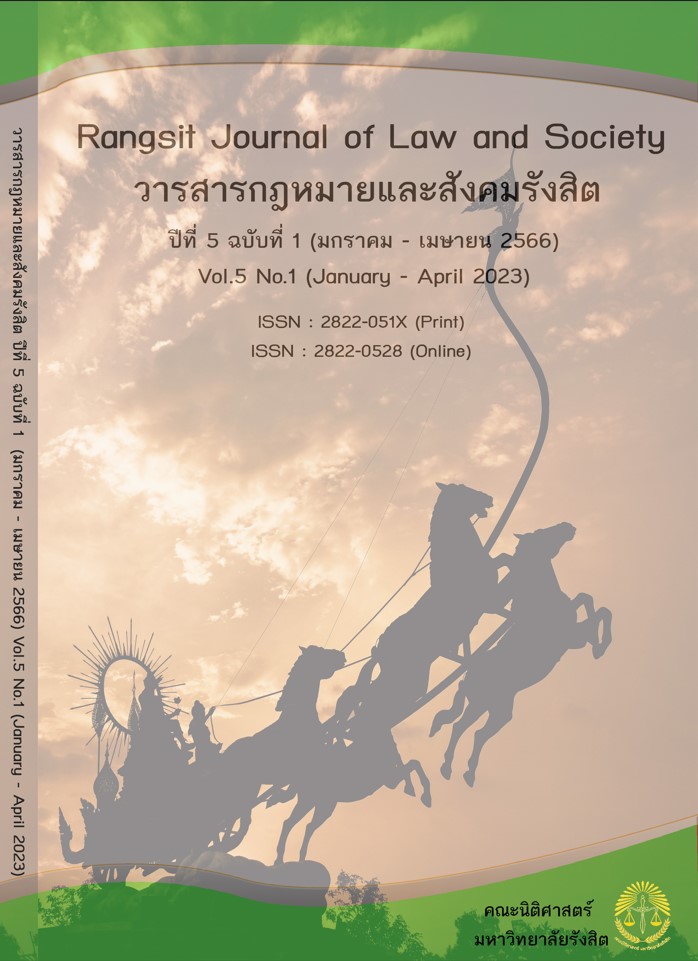ปัญหาทางกฎหมายเรื่องความรับผิดทางเสียหายที่ปัญญาประดิษฐ์ก่อขึ้น
Main Article Content
บทคัดย่อ
ปัจจุบันเราอยู่ในยุคโลกาภิวัตน์ ที่เทคโนโลยีมีความก้าวหน้าอย่างมาก กลายเป็นโลกไร้พรมแดน มีผู้คิดค้นเทคโนโลยีใหม่ๆ เพื่อตอบสนองความต้องการของมนุษย์มากขึ้น จนทำให้เทคโนโลยีกลายเป็นปัจจัยที่สำคัญในการดำรงชีวิต และเทคโนโลยีที่กำลังเป็นที่พูดถึงและเป็นที่สนใจของคนรุ่นใหม่ก็คือ ปัญญาประดิษฐ์ (Artificial Intelligence หรือ AI) ซึ่งปัญญาประดิษฐ์เป็นเทคโนโลยีที่ถูกพัฒนาและนำไปใช้ในด้านต่างๆ ซึ่งถือเป็นเทคโนโลยีที่ช่วยให้มนุษยชาติมีความก้าวหน้าทางวิทยาศาสตร์มากขึ้น อันได้แก่ ด้านความบันเทิง เช่น ระบบการเลือกภาพยนตร์ ในแอพพลิเคชั่น Netflix หรือระบบสุ่มวิดีโอใน Tiktok เพื่อตอบสนองความต้องการของผู้บริโภคจากความต้องการของผู้บริโภคเอง เป็นต้น ในส่วนทางด้านการแพทย์ เช่น การวินิจฉัยโรค การติดตามอาการของผู้ป่วย ที่จะช่วยให้เกิดประสิทธิภาพในการักษาคนไข้ได้ดียิ่งขึ้น เป็นต้น หรือจะเป็นอุตสาหกรรมด้านยานยนต์ นั่นก็คือ ระบบรถยนต์ไร้คนขับ (Auto pilot) ของรถ Tesla รวมถึงปัญญาประดิษฐ์ที่แฝงอยู่ในการใช้ชีวิตประจำวันของเรา เช่น ระบบปลดล็อคหน้าจอแบบ Face ID หรือ ระบบสั่งการด้วยเสียง เช่น Siri Alexa และ Google Assistance เป็นต้น จากที่กล่าวมาจะเห็นว่ามนุษย์พึ่งพาและใช้ประโยชน์จากปัญญาประดิษฐ์อย่างมาก แต่ทุกสิ่งบนโลกใบนี้ล้วนมีข้อดีและข้อเสีย ผู้ศึกษาจึงได้ตั้งคำถามว่าหากปัญญาประดิษฐ์ได้ก่อให้เกิดความเสียหาย ใครควรเป็นผู้ที่จะต้องเป็นคนรับผิดชอบในการกระทำของปัญญาประดิษฐ์ โดยบทความนี้จะศึกษาถึงประวัติความเป็นมา และแนวความคิดการใช้ปัญญาประดิษฐ์ การกระทำที่เป็นความผิดและความรับผิดของปัญญาประดิษฐ์ทั้งในทางแพ่งและทางอาญา รวมถึงข้อเสนอแนะและแนวทางการแก้ไขปัญหาเพื่อเป็นประโยชน์ในอนาคต
Article Details

อนุญาตภายใต้เงื่อนไข Creative Commons Attribution-NonCommercial-NoDerivatives 4.0 International License.
เอกสารอ้างอิง
เหมือน สุขมาตย์. (2562). ความรับผิดทางอาญาของปัญญาประดิษฐ์. วารสารวิชาการ คณะนิติศาสตร์ มหาวิทยาลัยราชภัฏอุบลราชธานี, ฉบับที่ 2 (ธันวาคม 2562).
โสภณ ศุภมั่งมี. (2561). เมื่อรถยนต์ไร้คนขับของ Uber ฆ่าคนตาย แล้วต่อจากนี้จะเกิดอะไรขึ้น? เรียกใช้เมื่อ 27 มีนาคม 2565 จาก https://www.gqthailand.com/toys/article/a-self-driving-uber-car-hit-and-killed-a-woman
ณัฐชนน อักษรารัตนานนท์. (2565). ความรับผิดทางอาญาเกี่ยวกับระบบปัญญาประดิษฐ์ ศึกษากรณีเฉพาะรถยนต์ขับเคลื่อนด้วยระบบปัญญาประดิษฐ์. เข้าถึงได้จาก http://libdoc.dpu.ac.th/thesis%20preview/Natchanon.Aks-Preview.pdf
ณัฐวุฒิ พงศ์สิริ. (2561). จริยธรรมในปัญญาประดิษฐ์. เรียกใช้เมื่อ 20 กันยายน 2561 จาก https://www.thansettakij.com/general-news/320036
ภูมินทร์ บุตรอินทร์. (2561). กฎหมายกับปัญญาประดิษฐ์. วารสารนิติศาสตร์, ฉบับที่ 47 (กันยายน 2561).
ศิลา วงศ์เจริญ. (2565). คนขับ Tesla ในคดีชนเสียชีวิตขณะใช้ Autopilot ถูกฟ้องอาญาเป็นครั้งแรก. เรียกใช้เมื่อ 19 มกราคม 2565 จาก https://www.beartai.com/news/car-news/920420
อธิวัฒน์ หิรัญวรวงษ์กุล. (2561). การแบ่งระดับความฉลาดของ AI. เรียกใช้เมื่อ 16 กรกฎาคม 2561 จาก https://bit.ly/2QP9hua
Garbriel, H. (2016). The Criminal Liability of Artificial Intelligence Entities - from Science Fiction to Legal Social Control. Akon Law Journal, 178.
Kingston, J. (2016). Artificial Intelligence and Legal Liability. Retrieved from https://www.researchgate.net/publication/309695295_Artificial_Intelligence_and_Legal_Liability
Ratirita. (2018). รู้จัก “โซเฟีย หุ่นยนต์ AI ตัวแรกของโลกที่ได้สัญชาติซาอุฯ. เรียกใช้เมื่อ 10 กุมภาพันธ์ 2561 จาก https://brandinside.asia/sophia-ai-robotics/
Sergio M. C. Avila Negri. (2021). Robot as Legal Person: Electronic Personhood in Robotics and Artificial Intelligence. HYPOTHESIS AND THEORY, article Volume 8 - 2021.

